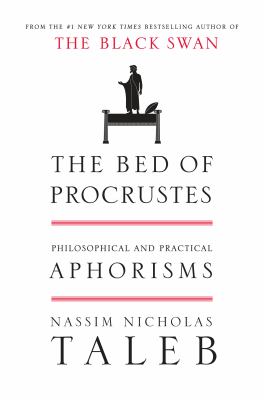Nassim Taleb, the philosophical and geographical flâneur (a stroller, physically and metaphorically, who has a "complete philosophical way of living and thinking" and a process of navigating erudition, that is, deep learning through experience, experimentation, socializing and self-directed reading, rather than through formal insitutional education) discussed in his The Bed of Procrustes the modern tendency to try to make life and the world fit our narrative notions instead of adapting our ideas to reality or admitting ignorance. Below are examples of modern variants of the Procrustean error supplied by Nassim and the Swedish "diet doctor," Aaron Eenfeldt, which involve medicating or even surgically altering our bodies to try to adapt them to modern diets and lifestyles instead of trying to restore the foods and environment we are naturally adapted to:
"Procrustes, in Greek mythology, was the cruel owner of a small estate in Corydalus in Attica on the way between Athens and Eleusis, where the mystery rites were performed. Procrustes had a peculiar sense of hospitality; he abducted travelers, provided them with a generous dinner, then invited them to spend the night in a rather special bed. He wanted the bed to fit the traveler to perfection. Those who were too tall had their legs chopped off with a sharp hatchet; those who were too short were stretched (his name was said to be Damastes, or Polypemon, but he was nicknamed Procrustes, which meant "the stretcher").
[W]e humans, facing limits of knowledge, and things we do not observe, the unseen and the unknown, resolve the tension by squeezing life and the world into crisp commoditized ideas, reductive categories, specific vocabularies, and prepackaged narratives, which, on the occasion, has explosive consequences. Further, we seem unaware of this backward fitting, much like tailors who take great pride in delivering the perfectly fitting suit—but do so by surgically altering the limbs of their customers. For instance few realize that we are changing the brains of schoolchildren through medication in order to make them adjust to the curriculum, rather than the reverse." -Nassim Taleb, PhD, The Bed of Procrustes (see http://www.fooledbyrandomness.com for more info)
Regarding bariatric surgery: "It's like trying to surgically alter our bodies to adapt to industrial food." -Aaron Eenfeldt, MD, "Evolution of a Diet Revolution," 2011 Ancestral Health Symposium, http://vimeo.com/29464690 (see http://www.dietdoctor.com/ for more info)

